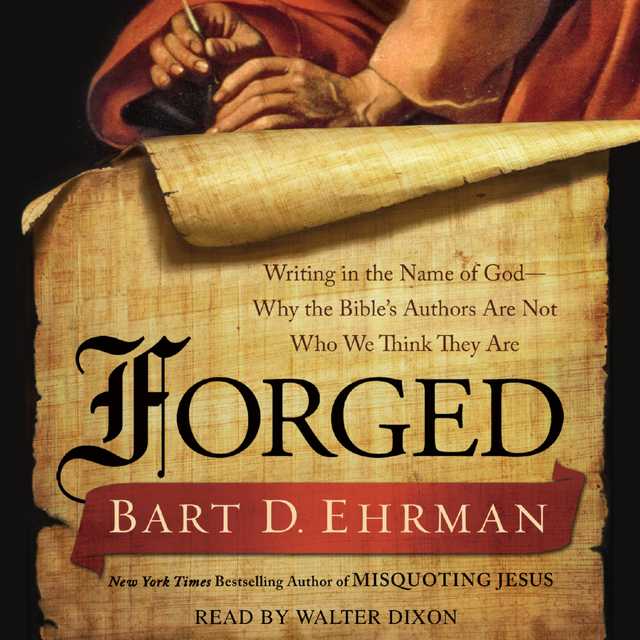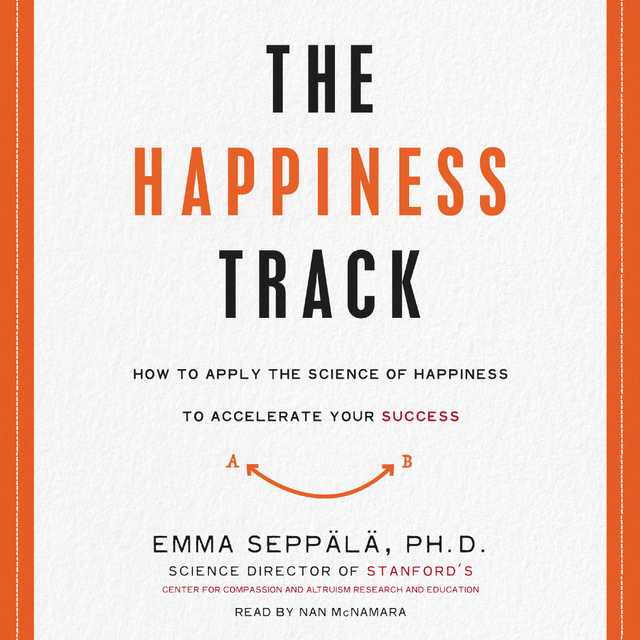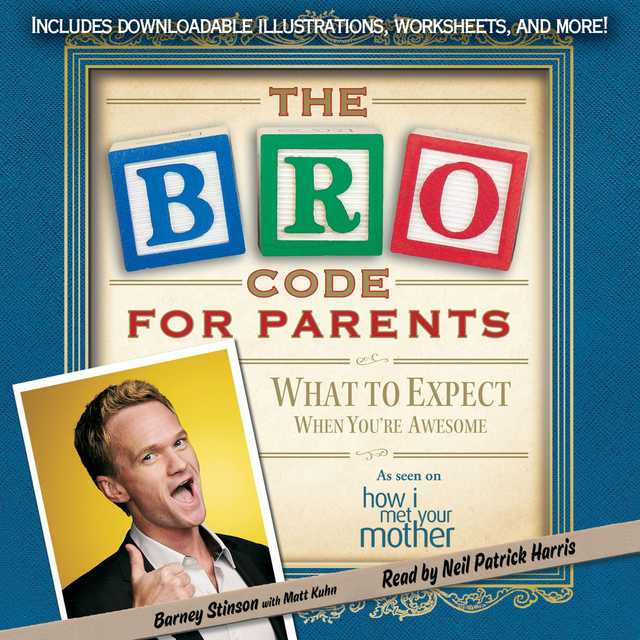Forged Audiobook Summary
Bart D. Ehrman, the New York Times bestselling author of Jesus, Interrupted and God’s Problem reveals which books in the Bible’s New Testament were not passed down by Jesus’s disciples, but were instead forged by other hands–and why this centuries-hidden scandal is far more significant than many scholars are willing to admit. A controversial work of historical reporting in the tradition of Elaine Pagels, Marcus Borg, and John Dominic Crossan, Ehrman’s Forged delivers a stunning explication of one of the most substantial–yet least discussed–problems confronting the world of biblical scholarship.
Other Top Audiobooks
Forged Audiobook Narrator
Walter Dixon is the narrator of Forged audiobook that was written by Bart D. Ehrman
Bart D. Ehrman is one of the most renowned and controversial Bible scholars in the world today. He is the James A. Gray Distinguished Professor of Religious Studies at the University of North Carolina, Chapel Hill, and is the author of more than twenty books, including the New York Times bestsellers How Jesus Became God; Misquoting Jesus; God’s Problem; Jesus, Interrupted; and Forged. He has appeared on Dateline NBC, The Daily Show with Jon Stewart, CNN, History, and top NPR programs, as well as been featured in TIME, the New York Times, The Washington Post, The New Yorker, and other publications. He lives in Durham, North Carolina. Visit the author online at www.bartdehrman.com.
About the Author(s) of Forged
Bart D. Ehrman is the author of Forged
More From the Same
- Author : Bart D. Ehrman
- Misquoting Jesus
- Peter, Paul, and Mary Magdalene
- Jesus
- Armageddon
- God’s Problem
- Publisher : HarperAudio
- Abraham
- American Gods [TV Tie-In]
- Dead Ringer
- House of Sand and Fog
- Prey
Forged Full Details
| Narrator | Walter Dixon |
| Length | 9 hours 43 minutes |
| Author | Bart D. Ehrman |
| Publisher | HarperAudio |
| Release date | March 22, 2011 |
| ISBN | 9780062027481 |
Additional info
The publisher of the Forged is HarperAudio. The imprint is HarperAudio. It is supplied by HarperAudio. The ISBN-13 is 9780062027481.
Global Availability
This book is only available in the United States.
Goodreads Reviews
Clif
April 28, 2011
The material covered isn't new to anyone familiar with critical biblical scholarship. However, Ehrman is different because of the following:1. He's willing to call it forgery, lying and deceit (where appropriate).2. He says those who use milder adjectives are not supported by the evidence.3. He used
Russell
June 15, 2011
I am a big fan of Bart Ehrman because, as an erstwhile Christian and venerable New Testament scholar, he is adequately equipped to discuss these subjects but unlike many Christian academics his agnosticism lends him an air of intellectual honesty which I, as an agnostic atheist interested in Christianity, sometimes find lacking in other New Testament scholars. Ehrman has a respect for his Christian material that axe-grinding atheists may lack but is not clouded by personal subjectivities and religious dogmas. Put simply, Ehrman is not afraid to call a spade a spade and this is what he does in Forged.Ehrman tells us that the consensus opinion amongst scholars is that the word ‘forgery’ is considered inappropriate apropos the pseudepigraphal books of the New Testament. Throughout the course of the book Ehrman explains that the arguments made to demonstrate that 'forgery' is an inappropriate label are themselves flawed and, thus, forgery is an acceptable term. Ehrman identifies three broad categories of authorship for the 27 books of the New Testament:Anonymous (mis-attributed) - the 4 gospels, Hebrews, 1st, 2nd & 3rd John.Orthonymous (correctly named) - 7 of Paul's epistles and Revelation was written by a John but is not, and neither does it claim to be, John the apostle.Pseudonymous (forged) - 6 Paulines, Acts (although anonymous it misleadingly implies authorship by a companion of Paul), 1st & 2nd Peter, James and Jude.If 11 of the 27 books of the New Testament are forgeries and the texts we have today have been changed, as argued by Ehrman in 'Misquoting Jesus', how can we possibly hope to know what the earliest Christians believed? When later Christians of a particular dogma forged and interpolated the earliest writings of the church in order to harmonize them with their own views, how can we be sure what or whom we are really reading?
Isa
October 14, 2022
Whilst not as jaw dropping as Misquoting Jesus, this is another solid book that outlines the corruption withIn Christian scripture, which works wonders for my Islamic faith, knowing how stringent we are to keep our books 100% accurate. I must admit though, It seems like Bart often goes out of his way to avoid any strengthening of the Islamic perspective even though his findings often back-up the Islamic viewpoint.
Dee
December 01, 2017
This is a fun book to read. Ehrman does not take himself too seriously, and enjoys teasing everyone from atheists to literalist fundamentalists. His topic this time? Which books of the New Testament are forged - that is, written by people other than the people said to be their writers. It's a fantastic fun read, and if you have to read just one book by Ehrman, make it this one. In the first part of the book, Ehrman defines his terms: What does forged really mean? What is pseudoepigraphical? How can you tell anyway? Why don't people call things in the Bible forged when they so clearly are? He makes sure the lines are clearly drawn, and also makes a point of being kind to those who disagree with him. Ehrman argues from the Bible itself and from what is known about the region. He notes that it's clear that Jesus of Nazareth had siblings, and that James was said to be one. He talks about the various names and nomenclatures, and sketches the conflict between the Jews, the early Christians who were Jewish, and the early Christians who were not Jewish. He is not afraid to call out antiSemitism - in fact, he notes that it's a good thing that several apocryphal and forged books did not make it into the canon, because they were even more antiSemitic than the ones that did make it in! (I don't know about you, but that makes me shudder.)He also doesn't have much truck with conspiracy theorists (and if you want to know more about that, by all means go on to read his book on The Da Vinci Code for giggles!) and he's not afraid to note the discrepancies between what we know and what has been assumed by many Biblical inerrancy advocates. He doesn't share my tremendous dislike for Paul, but then he believes that several of the books attributed to that person were in fact forged and so many of the worst passages he feels can't be laid at Paul's feet.By all means, read this! It's a quick and enjoyable glance through the edges of Biblical scholarship, and it's worth your time.
Libby
March 18, 2015
This book is another winner by Bart Ehrman, whose works I have reviewed before. Ehrman has the knack of dealing with complex issues in in assessable terms. He clears up murky issues, defines sneaky slippery terms and frequently footnotes to lead the reader to other authors' works. Needless to say, dealing with the issue of forgery or falsity in the Bible is a little like juggling live lobsters and lit dynamite, hot, emotional and controversial. Ehrman is an agile and dextrous juggler who leads his readers to the knowledge that many pastors don't mention in their average Sunday sermon. If you are emotionally wed to the notion that the Bible is the inerrant Word of God, this book make make you angry, confused or shaken. If you are open to his message, it will make you consider what you think you know about Scripture. To the amateur historian of religion, it is a picnic basket of delights. It should go on your shelf next to Jesus Interrupted, Lost Christianities and Misquoting Jesus.
David
November 08, 2014
Interesting book. A somewhat large percentage of the new testament was written by people other than who the works are attributed to. Sometimes it has been clear that these occurred and these works were officially blessed by the church, other times it has only been modern scholarship that has identified certain works as deceiving at the minimum. This book can in places present more detail than is necessary to make it's point but in spite of this is still a very insightful book well worth reading.
Richard
August 31, 2011
This is at least the 9th book I've read by noted Biblical scholar Bart Ehrman. I've enjoyed every one, including now Forged. As usual, the writing is clear and witty. Ehrman compellingly lays out the evidence that at least 10 of the 27 books of the New Testament are forgeries. That is, each of these books was written by someone other than the person who claims to be the author, in order to deceive the world at large in the early centuries A.D. There are other forgeries. Other New Testament books have significant sections that are forged, and many other books that did not become Scripture were also forged.(view spoiler)[Here are the NT books Ehrman believes likely are forgeries: 3 of the Pauline epistles (Ephesians, Colossians, 2 Thessalonians), the three Pastoral Epistles (1 Timothy, 2 Timothy, and Titus), and 4 of the Catholic Epistles (James, 1 Peter, 2 Peter, and Jude). He also believes the Gospel of Mark, Acts of the Apostles, and 1 Corinthians contain significant forged sections. (hide spoiler)]Why does this matter? Ehrman shows that the forged documents contain teachings, thought, and doctrine that are completely different from what the purported authors taught or believed, or in some cases cover topics that the purported authors did not address. People that believe the Bible is the inerrant Word of God, or at least is divinely inspired, and live their lives by it, ought to consider the implications of the presence of forgeries in the sacred text.Some of the forged books contain some rather key concepts. A few examples:>> From 2 Peter 3:8, "With the Lord a day is like a thousand years, and a thousand years are like a day.">> From 1 Corinthians 14:34-35, "Women should remain silent in the churches. They are not allowed to speak, but must be in submission, as the law says. If they want to inquire about something, they should ask their own husbands at home; for it is disgraceful for a woman to speak in the church.">> From Ephesians 2:4-6, "... God ... made us alive with Christ even when we were dead in transgressions—it is by grace you have been saved. And God raised us up with Christ and seated us with him in the heavenly realms in Christ Jesus..." (Here the contradiction is that in a genuine letter, Paul says "that the resurrection of believers was a future, physical event, not something that has already happened." [p. 111])All of these quotes are forgeries. Peter did not say "With the Lord a day is like 1000 years...". Paul did not make the statements attributed to him above.It may sound like this book would be a difficult read. It isn't at all difficult. In fact, Ehrman works in little quips like "Some docetists claimed Christ's body only seemed to be human, because it was, in fact, phantasmal (like Caspar the Friendly Ghost)." [p. 54] I can imagine that Ehrman writes like he lectures in class.In summary, a very interesting book that anyone who is interested in Christianity or general history should read. I assume some will have their beliefs vigorously challenged. For those that value truth, that is never a bad thing.
John
August 23, 2016
Wish I'd read Bart in my young, conceited seminary days. What a difference that would've made...Yet another brilliant book by Bart, this one dealing particularly with pseudonymous New Testament books (books written under a false name). Bart argues that these books are modern equivalents to Forgeries, pointing out how prevalent this practice in the early church and just how much it was generally condemned.He highlights books that didn't make it into the canon, primarily because they were deemed to be 'forgeries'. Others that made it into the final cut i.e New Testament that are actually 'forgeries'. He points out just how many scholars and theologians know of this fact, but are hesitant to call this practice for what it truly is.Most importantly he explains why these books couldn't have been written by their purported authors, and why the true authors lied about the authorship.I found this book to be quite a gem, truly insightful!Bart puts his points across in a very clear manner, hammering his points over and over and over again to a point where it does seem to get repetitive. Didn't mind though; that's what a good teacher does. I also love just how unbiased Bart's writing is. This is not a 'Bible hammering' bout as an atheist might expect and neither is it your typical Bible knowledge text-book. It's just an honest Bible exposition from a serious Bible scholar. Highly recommended for anyone who's really curious of New Testament authorship and the early church.
Darrel
December 13, 2012
This book felt like an easy walk and discussion with the author. I was pretty familiar with the territory he covers, but the greater detail was welcome as well as well reasoned arguments. I particularly liked how he used non-canonical and other ancient texts to illustrate the process of forgery, plagiarism, etc. I found his precision of language important in understanding the claims of moderns about ancient writers. I was told throughout my seminary and early religious training that forgery and plagiarism were common and, in any event, it didn't matter that many books in the bible were not written by the supposed author. The truth is the same, even if someone accidentally or intentionally put the wrong name on a book. Ehrman's arguments certainly destroy this rather quaint notion. A notion that is actually so foreign to the truth claims of Christianity, "You shall know the truth, and the truth shall make you free." In this case, freedom from believing the nonsense of the New Testament is the best result.
Miles
February 16, 2016
In early Christianity, the most beloved books of the new religion were read out loud in church. This was due to the illiteracy of most Christians but also to the need for the shared experience of hearing spiritually meaningful texts. There were no printing presses or photocopiers in those days. Each book had to be copied by hand, one at a time. It was a labor intensive and expensive task that was only done for free by the most devoted Christian scribe. One consequence of this was that only those books that were most beloved, and therefore copied many many times, enjoyed the statistical likelihood that at least one copy might survive to modern times, to be found in a library or rubbish heap by a nineteenth or twentieth century scholar. Another implication is that every forgery, especially if it has survived to surface in the present day, had a community that not only revered it but also lovingly copied, preserved and even translated it. The kinds of forged books that were rejected by the church are of great interest to the author of "Forged: Writing in the Name of God--Why the Bible's Authors Are Not Who We Think They Are," but he has caused the greatest controversy by openly discussing the evidence, some of it centuries old, that at least some of the books lovingly copied and preserved in the canonical New Testament are also forgeries.Professor Bart Ehrman defines literary forgery, sensibly enough, as writing something in the name of someone else (more often than not, someone far more famous than the forger), and he makes the case that forgery was not only very common in ancient times, but that the ancients did not take kindly to it. Forgeries were called lies and compared to illegitimate children by ancient authors who discussed the subject. Ehrman shows that common attempts to explain away forgery fly in the face of the evidence. For example, ancient writers generally did not allow their secretaries to compose letters in their names. In only one instance, Cicero is known to have had his secretary write a short form letter in his name, but no one is known to have pawned off an important letter in this way. Ehrman shows that many fanciful writings existed in early Christianity, most of which were never accepted as scripture. There were a few notable exceptions such as 1CThe Gospel of Peter, 1D which was read as if it were scripture by some churches in Syria for a while. At first, the bishop of Antioch accepted it without reading it, but when he got around to reading it, he decided that it contained heretical teachings; whereupon he ordered that the book be discarded and no longer read. Ehrman rather thinks the book a forgery not only because of its theology but because its attitude toward Jews is anachronistic and belongs to the second century, which is when this gospel was probably written 14a hundred years after Peter 19s probable death. (We only have legends and guesses about the dates of death for Peter and Paul; they are both presumed to have been executed about 64 AD.)What Ehrman reveals to the layman in this book 14something which scholars have long recognized 14is that some ancient forgeries found their way into the New Testament. One of the most blatant instances is 2 Peter (pronounced 1CSecond Peter 1D or, more formally, the 1CSecond Epistle of Peter 1D). It was actually widely considered to be a forgery by many churchmen in the second century. There was even a blind churchman among those who declared that someone falsely claiming to be Peter wrote the epistle, which entitles us to say that 2 Peter is so obviously a forgery that a blind man could see it; yet it made its way into the New Testament. How can you tell a forgery? Grammar, sentence length and other stylistic clues play a role, but, also, when you compare an authentic text to a forged one, contradictory historical details or a difference in theology can make the forgery stand out. Of the thirteen letters in the New Testament that are attributed to Paul, seven are consistent in both style and theology, even though they are each about different topics and were written for different ends. Of the other six, the three so-called 1Cpastoral 1D letters, 1 and 2 Timothy and Titus, are stylistically similar to each other but not to the seven authentic letters. These are sometimes thought to have been forged by the same person. The remaining three letters are each unique in style. The fourteenth letter sometimes attributed to Paul is Hebrews, but Paul did not write it and its author did not make much, if any, effort to persuade his readers that he was Paul.Theological differences are very important. For example, the theology of Paul 19s letter to the Romans (authentic) contradicts his supposed letter to the Ephesians (a forgery) on the topic of resurrection. Rather than think that Paul changed his mind about such an important subject, the more obvious conclusion is that the letters were written by two different authors, one being Paul and the other only claiming to be him. Another issue that some letters forged in Paul 19s name get wrong is that they confuse works according to the Jewish law (Paul 19s concern) with ordinary good deeds (the concern of pseudo-Paul in Ephesians). Interestingly, this helps us to identify a non-Pauline forgery: the Epistle of James makes this same confusion, and it is also a forgery.Ehrman argues that most of the books in the Bible were not written by the person to whom they have been attributed, but this does not prove forgery. In most cases, books in the Hebrew as well as Christian scriptures were composed anonymously and much later attributed to an author by copyists or readers. The authors of the New Testament gospels, Matthew, Mark, Luke or John, for example, do not explicitly name themselves. The names were assigned by churchmen who lived decades later. (The Gospel According to John has an epilogue that speaks of the author in the third person, identifying him with the figure of the Beloved Disciple, an unnamed figure within the gospel, but, even here, this dubious intra-textual attribution does not actually name the author.) The letters known as 1, 2 & 3 John as well as the Book of the Revelation to John get the benefit of the doubt because they never claim to have been written by John the apostle. That attribution appears to have been made by later churchmen.The New Testament forgeries identified by Ehrman are 1 Peter, 2 Peter, 1 Timothy, 2 Timothy, Titus, 2 Thessalonians, Ephesians, Colossians, James, Jude and 14believe it or not 14the Acts of the Apostles. The author of the Gospel According to Luke is widely considered to be the author as well of Acts, but even though the gospel cannot be regarded as a forgery, Ehrman makes a persuasive case that Acts should be, because there are several indications within Acts that the author means for the reader to believe that he is a companion of Paul 14something he never does in his gospel. Ehrman argues that the author of Acts cannot have been a companion of Paul. 1CLuke 1D contradicts Paul 19s letters (e.g., Galatians) historically and theologically, suggesting that the author was not with Paul and has a completely different agenda from him.Ehrman documents references to forgery from more than two thousand years ago up until recently. The main differences between ancient and modern forgeries are that there were no laws specifically against forgery, as there are now, and, today, forgeries are almost always motivated by greed. In ancient times, there were occasionally cases of forgery for profit. (The Roman physician Galen was a prolific author, and several books were forged in his name, which drove Galen himself to write a book on how to tell whether a book was by him or not.) But ancient forgeries were more often made because an author named John Doe knew that if he wrote a book on philosophy, no one would pay much attention, but if he signed the book in the name of Aristotle or Plato, readers would be more likely to take the obscure author 19s ideas seriously. This was probably the motivation of those who wrote epistles in the names of Peter, Paul and other apostles during the first centuries of Christianity.Why did the church let forgeries into the Bible? The early church was not capable of the kind of careful textual analysis that can reveal literary fraud in these texts. They mainly cared that the books were 1Corthodox 1D in their outlook (were consistent with the doctrines agreed upon by leaders of the church) and at least purported to be written by recognized authorities such as apostles or those who had known apostles in the first century. Unfortunately, discrimination was spotty when it came to recognizing that just because a book claimed to be written by an apostle, and just because its theology seemed unobjectionable to most church leaders, did not necessarily mean that it was authentic.A leading motive for writing such books was to combat the teachings of some other Christian sect. Early Christianity was not unified. Even the authentic letters of Paul complain of false teachers within the church. Often the forged books take one side or another in a theological dispute 14sometimes leading to both opposing views being included within the New Testament. The forged Letter of James, for example, asserts that Christians must do good deeds in order to be saved, while the author of Ephesians, who falsely claims to be Paul, says that good deeds will not lead to salvation. Both seem to misunderstand the theology of the real Paul, who maintains that the works of the Hebrew law are not required for salvation, but urges Christians to follow a code of conduct.Though Ehrman is primarily concerned with Christian examples of forgery and other kinds of literary fraud, outside and inside the New Testament, he mentions a couple of examples of forgery in the Hebrew Scriptures, such as the Book of Daniel that purports to be about four-hundred years older than it actually is. He cites many examples of forgery outside the New Testament to show that the phenomenon was common in the early Christian church. Though Christian forgeries appeared mainly during the first few centuries of the Christian era, Ehrman ends his book with some examples of nineteenth and twentieth century forgeries of Christian documents.
William
October 17, 2019
When I was a child, I owned several Bibles. I might have even told this story before, about how I wondered why of all the apostles, only four of them wrote anything about their experiences with Jesus. This comes to me through the Gospels. I am aware of several things in the New Testament written by Peter, and several things written by Paul.With Forged, author and biblical scholar Bart D Ehrman explores the veracity of claims that certain books were written by who they state they were written by. This book focuses squarely on the New Testament. It calls into question the idea that the Apostles were even literate at all. Even the idea of the Apostles using an amanuensis is called into question. Take the Book called 1 Peter for instance. It is used to show that Peter must have had a deep understanding of the Septuagint and enough knowledge in Greek to be able to argue persuasively in this language. Given Simon Peter’s history and upbringing, this is highly unlikely. Even the biblical accounts of Simon Peter call him an uneducated fisherman. Could he have been filled with the Holy Spirit and learned all that stuff through divine power? Probably not. It even alludes to the destruction of the Temple of Jerusalem, which didn’t happen until after Simon Peter was most likely deceased.Ehrman takes care to differentiate the terms he is using to discuss forgeries and how they are perceived. Since the book is written for the layman and not his fellow scholars, the book doesn’t go too deeply into the evidence and the technical aspects of the situation. Apparently, a number of people ask ‘why,’ why would someone go to the trouble of pretending to be a famous person? I had to do a double-take when I read that. I suppose that means I am terribly jaded and lack trust in humanity, but how naive do you have to be to not realize that writings have way more weight if they are thought to be genuinely written by a famous person? This happens all the time. Back in the 1980s, there was a famous forgery case with the so-called Hitler Diaries. This is a tale as old as time. Even back in the time of Galen.So this book explores how different Gospels and letters made no sense, and how they were possibly forged. It makes for a fascinating read.
Moshe
March 24, 2019
As with his other books, Ehrman brings so many examples and repeats the reasoning why many of the new testament and some other Christian books are forgeries and not original works. I wish there was a similar book also for the old bible.
James
August 29, 2020
While it probably could have been a little longer and more detailed, this is a fantastic introduction to ancient forgery for laymen. The book clearly distinguishes between many dubious/dishonest literary practices (forgery, fabrication, falsification and plagiarism) and gives a nuanced account of the different motivations and thoughts potentially underlying each of these undertakings.The book also introduces readers to a great many ancient sources that they are likely to have been completely unfamiliar with. Loads of non-canonical gospels, epistles and other texts were circulating in the time of the early church, and many of these were taken very seriously by different groups of Christians. The book does a great job at tying different forged texts to different sects, detailing what motivated the forgeries (and other such practices) and how the forged documents effectively promoted particular Christian concepts or addressed the theological problems of their day (e.g., Paul advised against marriage because the end was near anyway, so people should focus on spreading the gospel, while Pastoral Letters forged in his name promote marriage and the idea that the end may not be as imminent as some people think, most likely because the imminent that was expected was looking increasingly dubious).Particularly interesting was Ehrman's analysis of forgery and counter-forgery by Christians to rebut other Christians. The most vociferous philosophical fights were between competing Christian sects, and there are many forged documents promoting one view over another, with proponents of the latter then forging their own scriptures to rebut the former. This is fascinating in and of itself, but more so when you consider the major mystery that Ehrman presents to us throughout the book, which is that all of these sects believe they have the truth and that truth is paramount, but the method they use for promulgating truth is dishonesty (e.g., forgery or falsification).Did the writers of these deceptive works believe they were being dishonest? Did they experience any cognitive dissonance when forging documents? Ehrman takes a very open-minded approach to exploring that question, and concludes that there is no easy answer. He explores many knee-jerk rebuttals (e.g., that forgery was not considered to be an abominable practice in ancient times), all of which he refutes persuasively, and ultimately concludes that it is hard to know the extent to which the authors thought themselves dishonest, but we can certainly conclude that they intended to deceive their readers.How this bodes for Christianity is another interesting point, which Ehrman touches on. I've asked Christians what they think of the possibility (I agree with Ehrman that it's a certainty) that many documents considered to be scripture (e.g., 2 Peter and Titus) are forgeries and how concluding this would effect their faith. Interestingly, those who accept the possibility do not seem to care, and many respond in ways that Ehrman anticipates in the book (e.g., that the works were still inspired, but needed to carry an authoritative name). Ehrman effectively rebuts such notions too, which makes this a very handy book for counter-apologetics.All in all, this is a fantastic little book. Those who are interested in a more detailed and rigorous exploration of forgery in Christian literature will probably prefer Ehrman's other book 'Forgery and Counterforgery', but seeing as this is a book for laymen, it should be treated as such. 5/5!
Jamie
December 19, 2018
I have great respect for Bart Ehrman. For most people a fundamentalist upbringing like his would have locked them into an unchangeable point of view that no amount of logic, reason, or scholarship could change, the classic, “the Bible says it, I believe it, that settles it” worldview. To his credit, Ehrman was able to look deeply into Christian apologetics and, when he saw that they were misleading, logically inconsistent, or outright false, he was able to separate his personal faith from his rational understanding and say, in the words of Gershwin, “It ain’t necessarily so….”For the true believers, no amount of evidence is enough. They believe because they believe because they believe. This book was not written for them, and, of course, they wouldn’t read it anyway. It was written for people with an interest in history who are not afraid of where the search for truth might lead. For them, this is an excellent book, an overview of biblical philology and current scholarship written in non-technical terms for a general audience.Even for the nonbelievers, who have a low opinion of Biblical truthfulness to begin with, there is a lot of interesting discussion in this book. It is remarkable how much of the authorship of the New Testament is misattributed or outright fraudulent, and this isn’t just Ehrman’s opinion, it is the general, noncontroversial consensus of religious scholars. For the cynics among us, this is not surprising at all: history is full of pious frauds, as shown in the sorry history of sacred relics. After all, you could have rebuilt Noah’s arc out of all the pieces of the One True Cross that were floating around Europe. Still, it is interesting, even amusing to speculate on the mindset of the authors of the forgeries. Were they thinking, “This is what God would have said if He had got it right.”?Ehrman first builds a strong case proving that many of the books of the New Testament are indeed forgeries, based on textual analysis of things like vocabulary, structure, and content. He then demolishes the argument that forgeries were an accepted and uncontroversial part of the early Church. In fact, the Church had a strong incentive to establish an orthodoxy based on the most reliable sources available, and condemned the practice of falsely attributing religious texts.I have enjoyed every one of Bart Ehrman’s books. They are written in an engaging, nontechnical style, and he does a fine job supporting his hypotheses with historical, and textual scholarship. I highly recommend this book.
Frequently asked questions
Listening to audiobooks not only easy, it is also very convenient. You can listen to audiobooks on almost every device. From your laptop to your smart phone or even a smart speaker like Apple HomePod or even Alexa. Here’s how you can get started listening to audiobooks.
- 1. Download your favorite audiobook app such as Speechify.
- 2. Sign up for an account.
- 3. Browse the library for the best audiobooks and select the first one for free
- 4. Download the audiobook file to your device
- 5. Open the Speechify audiobook app and select the audiobook you want to listen to.
- 6. Adjust the playback speed and other settings to your preference.
- 7. Press play and enjoy!
While you can listen to the bestsellers on almost any device, and preferences may vary, generally smart phones are offer the most convenience factor. You could be working out, grocery shopping, or even watching your dog in the dog park on a Saturday morning.
However, most audiobook apps work across multiple devices so you can pick up that riveting new Stephen King book you started at the dog park, back on your laptop when you get back home.
Speechify is one of the best apps for audiobooks. The pricing structure is the most competitive in the market and the app is easy to use. It features the best sellers and award winning authors. Listen to your favorite books or discover new ones and listen to real voice actors read to you. Getting started is easy, the first book is free.
Research showcasing the brain health benefits of reading on a regular basis is wide-ranging and undeniable. However, research comparing the benefits of reading vs listening is much more sparse. According to professor of psychology and author Dr. Kristen Willeumier, though, there is good reason to believe that the reading experience provided by audiobooks offers many of the same brain benefits as reading a physical book.
Audiobooks are recordings of books that are read aloud by a professional voice actor. The recordings are typically available for purchase and download in digital formats such as MP3, WMA, or AAC. They can also be streamed from online services like Speechify, Audible, AppleBooks, or Spotify.
You simply download the app onto your smart phone, create your account, and in Speechify, you can choose your first book, from our vast library of best-sellers and classics, to read for free.
Audiobooks, like real books can add up over time. Here’s where you can listen to audiobooks for free. Speechify let’s you read your first best seller for free. Apart from that, we have a vast selection of free audiobooks that you can enjoy. Get the same rich experience no matter if the book was free or not.
It depends. Yes, there are free audiobooks and paid audiobooks. Speechify offers a blend of both!
It varies. The easiest way depends on a few things. The app and service you use, which device, and platform. Speechify is the easiest way to listen to audiobooks. Downloading the app is quick. It is not a large app and does not eat up space on your iPhone or Android device.
Listening to audiobooks on your smart phone, with Speechify, is the easiest way to listen to audiobooks.






























